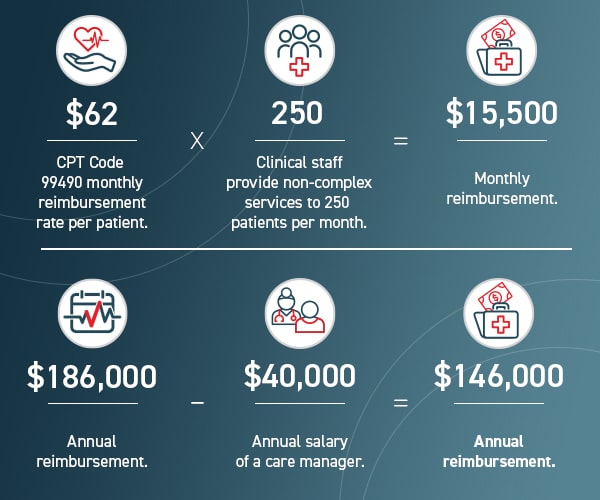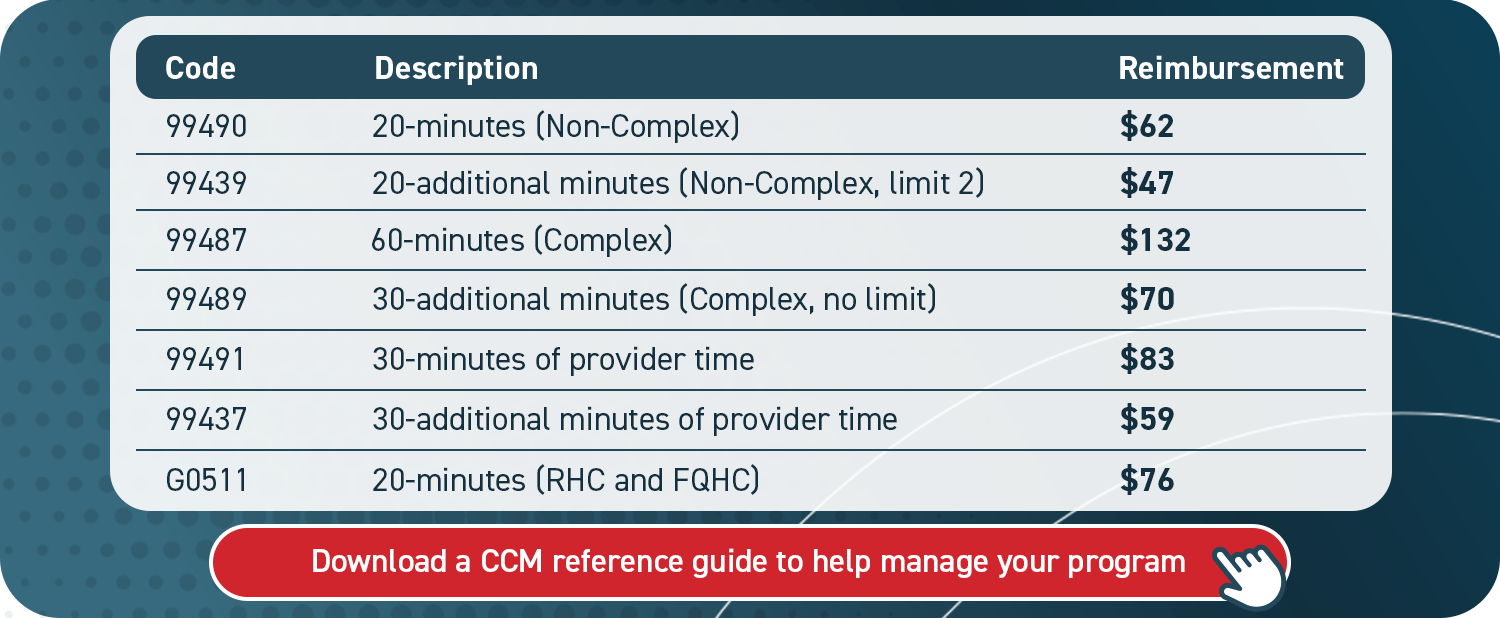What Are the 2022 CPT Codes for Chronic Care Management?
Medical reimbursements are tied to Current Procedural Terminology (CPT) codes. They categorize and specify billing rates and rules for procedures, treatments, and care services.
If you’re a medical care provider, you likely know this. But do you know the rates and workflows for Medicare’s wellness programs? Like, Chronic Care Management (CCM)?
Knowing the billing codes for CCM will give you a better idea of what’s expected, both by the patient and Medicare.
Understanding billing codes will also help you project revenues and optimize your staff’s capacity. Without this information, you risk disorganization and a clouded outlook.
At ThoroughCare, we’ve worked with nearly 600 clinics and physician practices to help them streamline and capture Medicare reimbursements.
Our software assists with CCM’s rules and regulations, and it tracks all activities related to providing the program, making it easier to bill for.
In this article, we’ll briefly review the requirements of CCM, as well as the program’s CPT codes. We’ll also provide an example return-on-investment (ROI) of an effective CCM program.
With this information, you’ll better understand CCM billing expectations and standards. You’ll also see how care coordination software can simplify the program.
How Does Chronic Care Management Work?
Medicare established Chronic Care Management (CCM), so doctors and healthcare groups
can provide ongoing treatment to patients between regular appointments.
CCM is a monthly program. At least 20 minutes of patient service must be provided each month for Medicare to offer reimbursement.
To enroll a patient, they must have two or more chronic conditions expected to last at least 12 months. The patient’s doctor must note any chronic issues 12 months prior to CCM enrollment.
These conditions must pose a significant risk of death, acute decompensation, or decline.
Services are delivered through remote interactions. These can include:
- A monthly clinical review
- Telephone calls
- Physician reviews
- Referrals
- Prescription refills
- Chart reviews
- Scheduling appointments/services
Services are based on a patient’s individual care plan. This document is a comprehensive guide to a patient’s goals, health history, and behavior.
It is created in collaboration with the patient when CCM enrollment begins.
Medicare Part B covers 80% of this benefit for patients.
Providers, on average, receive $62 for 20 minutes of service per month. Additional opportunities to meet higher billing thresholds are available, as we will detail below.
How to Bill for Chronic Care Management
There are five items required when submitting a claim through CMS:
- CPT Codes for each program you’re managing for the patient
- ICD-10 codes tied to each of the conditions you’re managing within that program
- Date of service
- Place of service
- Provider name
While it’s not needed, it is helpful to know the care manager assigned to a patient in case you’re ever audited: When billing, you’ll calculate the time spent with each of your patients monthly.
These are the four steps you’ll take when billing:
- Verify CMS requirements were met for each patient each month
- Submit claims to CMS monthly
- Send an invoice to patients receiving CCM services monthly
- Make sure there are no conflicting codes that have been billed
CPT Codes for Chronic Care Management
Click here for 2025 reimbursement information.
CPT codes for chronic care vary depending on who provides the service, as well as its complexity. Each code reflects a different value and the amount of time dedicated to care management.
In the following section, we break down the various types of billing codes for CCM.
CPT Codes for Non-complex Chronic Care Management
For the reimbursement of non-complex chronic care by clinical staff, the following rates apply. They are based on national averages, which may vary by the locality:
- CPT code 99490 for 20 minutes of billable time at a $62 reimbursement
- CPT codes 99490 + 99439 for 40 minutes of billable time at a $109 reimbursement
- CPT codes 99490 + 99439 (x2) for 60 minutes of billable time at a $156 reimbursement
For rural health clinics (RHCs) and federally qualified health clinics (FQHCs), the following CPT code for "general care management" would apply for CCM.
- CPT code G0511 for 20 minutes of billable time at a $76 reimbursement
When billing for chronic care services, you must present two ICD-10s (as CCM requires two or more conditions to be present).
You can only bill for one series of CCM services per patient, per month. For example, you can only submit a claim for either non-complex CCM or complex CCM. Not both.
CPT Codes for Physician-driven, Non-complex Chronic Care Management
CCM services are not reliant on clinical staff; some physicians are more hands-on than others.
The following billing codes were created to reflect the value of these physicians’ time.
They are for non-complex chronic care, where the provider or non-physician practitioner (NPP) is heavily involved. They cannot be billed concurrently with standard CCM CPT codes.
For non-complex care driven by the physician, you would use the following billing codes:
- CPT code 99491 for 30 minutes of billable time at an $83 reimbursement
- CPT codes 99491 + 99437 for 60 minutes of billable time at a $142 reimbursement
CPT Codes for Complex Chronic Care
For complex care, the following billing codes apply:
- CPT code 99487 for 60 minutes of billable time at a $130 reimbursement
- CPT codes 99487 + 99489 for 90 minutes of billable time at a $198 reimbursement
It is important to note that CPT code 99487, which accounts for 60 minutes of complex chronic care, differs from 60 minutes of non-complex CCM service. The distinction is clear. But it’s key to utilize the correct code when providing complex care.
In the case of an audit by Medicare, you’ll want to show the correct code was applied based on the situation. Some providers have run into trouble by failing to bill the accurate code.
What is the ROI of Chronic Care Management?
While the phrase return on investment (ROI) holds a financial connotation, a “return” isn’t entirely dependent on monetary value. General benefits are equally important, especially with regard to a person and their health.
Your patients will benefit from CCM because it places a preventive eye on their health.
According to the Journal of General Internal Medicine, patients reported several benefits with CCM. It improved access to their primary care team and strengthened care coordination.
These elements generally reduce the need for emergency room visits. According to Medicare, CCM can save healthcare costs of up to $74 per patient, per month.
On the provider side, this benefit plays right to the goal of value-based healthcare.
Reduced hospital visits help satisfy certain performance indicators measured by Medicare.
This can help providers sustain or improve their Merit-based Incentive Payment System (MIPS) score, which can raise reimbursement rates.
How Can Chronic Care Management Produce Revenue?
As for CCM reimbursement rates, what is the revenue opportunity of the program?

The final figure in the graphic does not account for complex or physician-driven CCM services. Nor does it include additional billable time beyond the 20-minute minimum. Both could produce a higher figure.
Offering a CCM program can generate revenue, and it can recover costs and broaden care access for your patients. The combination is inherently valuable.
Streamline CCM With Care Coordination Software
To deliver and document CCM services, you’ll want a system in place to manage your program.
A practical resource, such as care coordination software, will keep key details from being lost or overlooked. This will promote efficiency for you and your staff and help patients succeed. Care coordination software can streamline the creation of patient care plans, support staff workflows, and simplify billing. ThoroughCare’s software solution offers these exact features.
With a clinician’s eye, we’ve designed an intuitive platform that untangles the entire CCM process, so you and your patients can capitalize on it. Our care coordination software solution enables you to offer a whole suite of wellness services that pair well with CCM, such as Behavioral Health Integration (BHI) or Remote Patient Monitoring (RPM).




